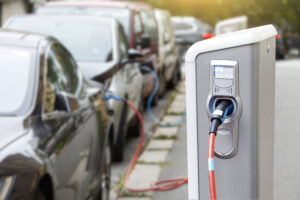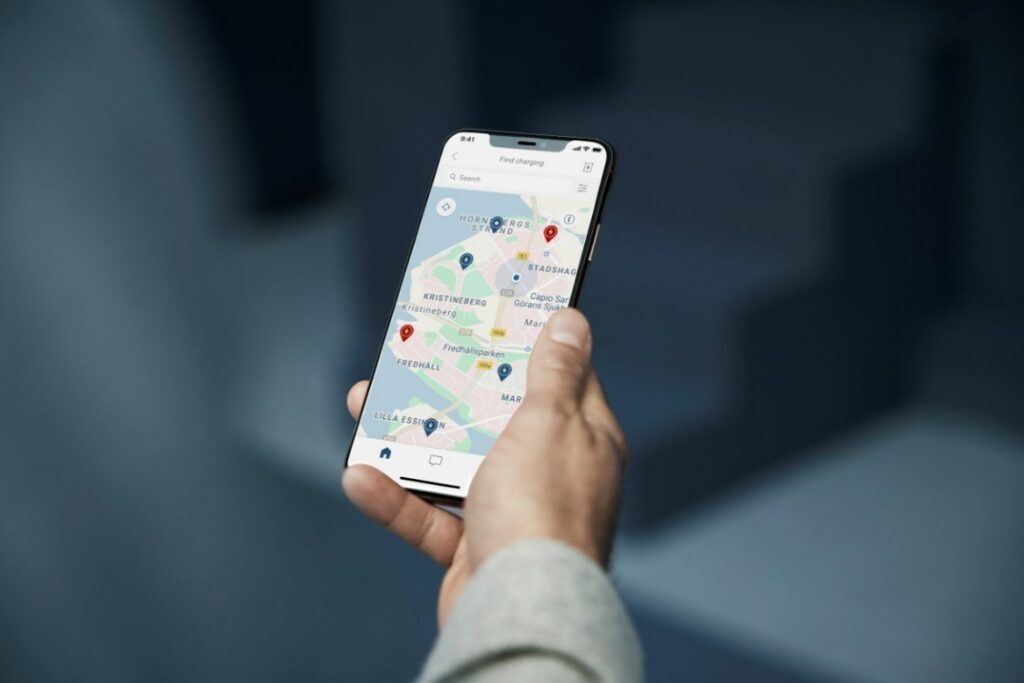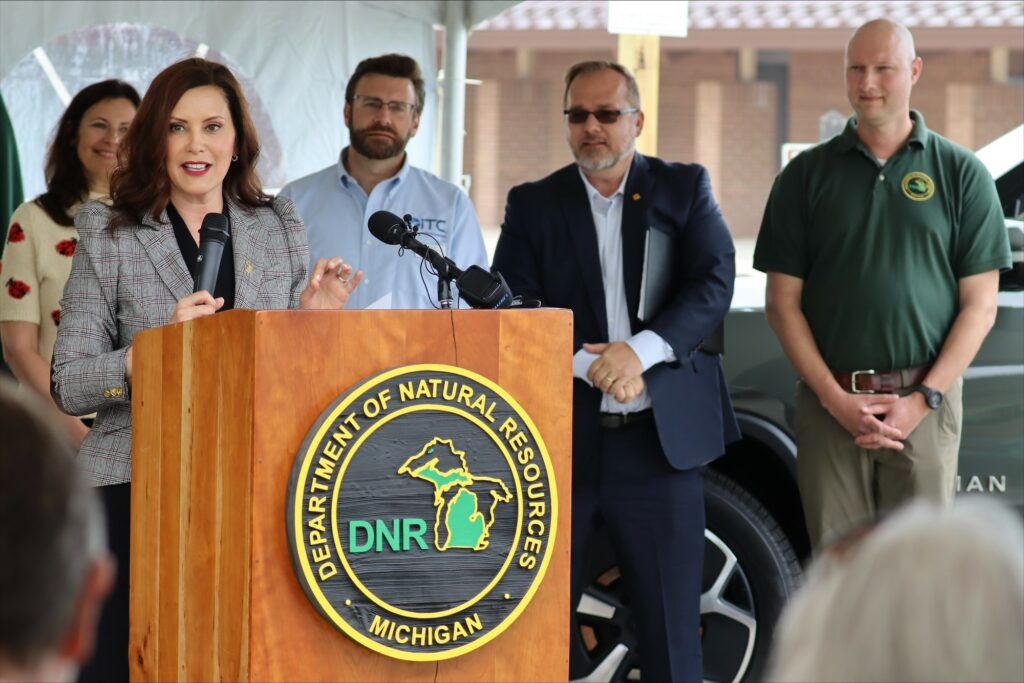
Michigan, Rivian & others building up number of EV charging stations; Volvo to release charging services app
By onMarket Trends | Technology
Michigan along with electric vehicle (EV) OEM Rivian and others have partnered to provide public EV charging stations across the state as Volvo works to release a new app in the U.S. to help its owners find charger locations and more.
Michigan Gov. Gretchen Whitmer along with other state and local officials, Rivian, and representatives from the nonprofit organization Adopt a Charger gathered last week in Holland State Park to unveil two Rivian Waypoints charging stations that had been installed. The charging site is the first of 15 that will be installed at state parks and a state fish hatchery over the next few years.
Rivian — under an operating agreement between Adopt a Charger and the Michigan Department of Natural Resources — will provide open-network, Level 2 Rivian Waypoints chargers at no cost to the state or taxpayers at each of the sites. The chargers are equipped with a J1772 plug, which is suitable for all EVs.
Adopt a Charger will provide technical, marketing, and sponsorship support for the operation of the chargers throughout the duration of the agreement.
“The Adopt a Charger goal is to enable zero emission tourism in Michigan and inspire visitors of all ages to consider the impact of their decisions on the environment,” said Kitty Adams Hoksbergen, executive director of Adopt a Charger. “…I grew up camping with my family at Michigan State Parks, and am grateful to be promoting what I believe in while supporting the places special to me”
ITC, an electric transmission company, will provide funding for electrical use for two years. Consumers Energy, through the Power MI Drive program, is paying for upgrades to the electrical systems at state parks that are necessary for the chargers to be installed.
“This partnership to install charging stations in our state parks speaks to the collaborative approach we are taking to grow our economy and address climate change head-on through clean, reliable energy,” said Whitmer, according to a state news release. “These charging stations along the Lake Michigan EV Circuit build on our rich Pure Michigan tradition of exploration and bringing together communities and businesses to ensure that we honor our past as the place that put the world on wheels and continue to invest in our workforce as we lead the transition to electric vehicles. Together, we will keep growing our economy, creating good-paying jobs, and lowering costs for drivers and working families.”
The state park charger installations are part of Whitmer’s 2021 Lake Michigan EV circuit announcement — an EV route with reliable charging options along Lake Michigan and key tourism clusters meant to create the best new road trip for EV owners in America.
Rivian Senior Director of Public Policy Chris Nevers applauded the state for “continuing to adopt policies that keep Michigan at the forefront of innovative electric mobility.”
“Our state parks charging program is how we come together with our partners to offer a solution to EV-charging gaps,” he said, according to the release. “We’re making this investment because we believe that exploring the natural world should be possible without contributing to local air pollution, climate change, or damaging the environment.”
From Warren Dunes State Park in the southwest corner of the Lower Peninsula, north along the Lake Michigan “gold coast” and additional points inland, an estimated 30 chargers are scheduled to be installed as part of the first phase of the project with the next installations beginning this summer and throughout the rest of the year, according to the release. State parks in the Upper Peninsula are slated to be part of the second phase next year.
The tentative list of charger installations at state parks this year include:
-
- Two at Warren Dunes in Berrien County
- Two at P.J. Hoffmaster in Muskegon County;
- Two at Charles Mears in Oceana County;
- Two at Ludington in Mason County;
- Two at Orchard Beach in Manistee County;
- Two at Leelanau in Leelanau County;
- Two at Young in Charlevoix County;
- Two at Petoskey and Wilderness in Emmet County;
- Two at Interlochen in Grand Traverse County;
- Four at Holland and Grand Haven in Ottawa County; and
- Two at the Oden State Fish Hatchery in Emmet County.
Installations are anticipated in subsequent years at Palms Book State Park in Schoolcraft County and Fayette Historic State Park in Delta County.
“This project will not only benefit Michigan in the near term but will also pay dividends far into the future as we move toward a sustainable energy future,” said Department of Natural Resources Director Dan Eichinger, according to the release. “From these EV charging stations, to installations of solar arrays that power fish hatcheries and other facilities, to building with mass timber and our innovative carbon sequestration development, we are working to improve the environment as we update our own portfolio.”
Michigan’s Office of Future Mobility and Electrification Chief Mobility Officer Trevor Pawl said “innovative initiatives” such as this partnership “are vital to ensuring EVs can be more easily incorporated into our everyday lives, regardless of where you are in the state.”
“By identifying creative partnerships and opportunities, we are making significant progress in creating a safer, more equitable and environmentally conscious transportation future for all Michiganders.”
To learn more about how Michigan’s transportation mobility and electrification plans, visit michiganbusiness.org/mobility.
Volvo is also working to develop more charging options for EV drivers.
The OEM plans to be fully electric by 2030 and believes that for the widespread adoption of all-electric vehicles to happen it should be easy and convenient to charge them, according to a news release. The OEM’s solution for both is the new Volvo Cars app, which is set to launch in the U.S. by the end of the year. Volvo owners will be able to use it to view public charging station locations and availability and to pay for charging.

“Many of us are familiar with the frustration of having to navigate multiple apps and carrying multiple cards for different charging operators,” said Olivier Loedel, head of Electrification Ecosystem at Volvo Cars, in a statement. “Our goal was to make life easier for our customers and remove one of the major barriers for customers to switch to an electric car. With the Volvo Cars app, we will create one digital charging platform.”
The app is designed to build on the already successful ChargePoint in-car app for U.S.-based Volvo Recharge customers, which allows for searching, navigating, and paying for charging at one of more than 25,000 charger locations. ChargePoint is available for anyone with an EV to use, according to Volvo spokesperson Ian Tonkin.
As of model year 2023, fully electric Volvo cars in the U.S. will come with a complimentary three-year 250 kWh DC fast charging pass with Electrify America and a subsequent one-year Electrify America Pass+ membership.
Earlier this year, Volvo Cars USA announced a collaboration with Starbucks to install 60 Volvo-branded, ChargePoint-powered DC fast chargers at coffee shop locations along a 1,350-mile route from the Denver area to the Seattle headquarters.
IMAGES
Featured image credit: Scharfsinn86/iStock
Michigan Gov. Gretchen Whitmer speaks on May 26, 2022 during a gathering at Holland State Park to unveil two Rivian Waypoints charging stations that had been installed there as part of a statewide EV charging infrastructure project. (Photo provided by the Executive Office of the Governor)
Volvo Cars app shows charging station locations on a map. (Provided by Volvo)

